* You are viewing Posts Tagged ‘Networks’
Kim McLean-Fiander
November 12, 2010
Calls for Papers, Conferences and Workshops, Events, Project Updates
Tags: Censorship, Commerce, Communication, Exchange, Networks, Propaganda, Seventeenth Century
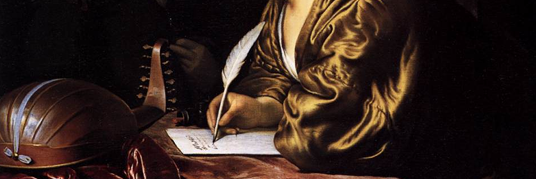
A Woman Writing a Letter (1680) by Frans van Mieris
The University of Reading Early Modern Studies Conference will take place 18–20 July 2011. Organised by the Early Modern Research Centre, the conference takes as its theme Communication and Exchange and will feature both a panel on Cultures of Knowledge and a plenary session by the Project Director Professor Howard Hotson. The conference hopes to generate new thinking and debate on such questions as: what forms did communication and information take (oral, printed, numerical, or even visual), how did its forms change, and how was it circulated; what did people know about the world outside their own immediate spheres in the early modern period; what new techniques for the calculation and expression of information appeared; how far was information managed by government through propaganda and censorship or the maintenance of secrecy; did changing practices of communication stimulate the emergence of new genres; how did the stock of knowledge of the world increase through the endeavours of seamen, merchants, factors and adventurers as well as scientists and travel writers; and what part did patronage and the commerce in books and manuscripts play? The deadline for paper and panel proposals is 31 January 2011. Further details are available in the full call for papers (pdf).
 A recent correspondence-related public lecture by our Martin Lister Research Fellow Dr Anna Marie Roos has now been published as a podcast. The lecture, which took place at Oxford’s Museum of the History of Science on Tuesday 26 October, was entitled ‘The Oxford Philosophical Society and the Royal Society: A Meeting of Minds?’, and described the formation of the Oxford group, the work done under the direction of Robert Plot, and its relationship with the Royal Society: a tale of collaboration as well as rivalry. The podcast is available for listening and downloading on the MHS website.
A recent correspondence-related public lecture by our Martin Lister Research Fellow Dr Anna Marie Roos has now been published as a podcast. The lecture, which took place at Oxford’s Museum of the History of Science on Tuesday 26 October, was entitled ‘The Oxford Philosophical Society and the Royal Society: A Meeting of Minds?’, and described the formation of the Oxford group, the work done under the direction of Robert Plot, and its relationship with the Royal Society: a tale of collaboration as well as rivalry. The podcast is available for listening and downloading on the MHS website.
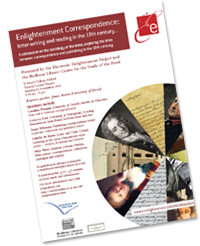 The first Electronic Enlightenment colloquium on the sociology of the letter – Enlightenment Correspondence: Letter-Writing and Reading in the Eighteenth Century – will take place at St Anne’s College on Saturday 13 November 2010. Co-sponsored by the Bodleian Library’s Centre for the Study of the Book, the colloquium will provide a forum for academics and graduate students interested in both correspondence about publishing and the publication of correspondence itself in the Enlightenment period. The event includes papers by keynote speaker James Raven and other scholars from the UK and US on publishing and private correspondence, letters in lives and works, letters as primary sources, and letters as historical documents. For further information, including a list of speakers, paper titles, the programme schedule, and registration information, please visit the colloquium webpage.
The first Electronic Enlightenment colloquium on the sociology of the letter – Enlightenment Correspondence: Letter-Writing and Reading in the Eighteenth Century – will take place at St Anne’s College on Saturday 13 November 2010. Co-sponsored by the Bodleian Library’s Centre for the Study of the Book, the colloquium will provide a forum for academics and graduate students interested in both correspondence about publishing and the publication of correspondence itself in the Enlightenment period. The event includes papers by keynote speaker James Raven and other scholars from the UK and US on publishing and private correspondence, letters in lives and works, letters as primary sources, and letters as historical documents. For further information, including a list of speakers, paper titles, the programme schedule, and registration information, please visit the colloquium webpage.
James Brown
October 12, 2010
Conferences and Workshops, Events, Project Updates
Tags: Communication, Encyclopaedism, Europe, History of Science, Jan Amos Comenius, John Aubrey, Millenarianism, Networks, Pansophia, Samuel Hartlib, Seventeenth Century, Universities
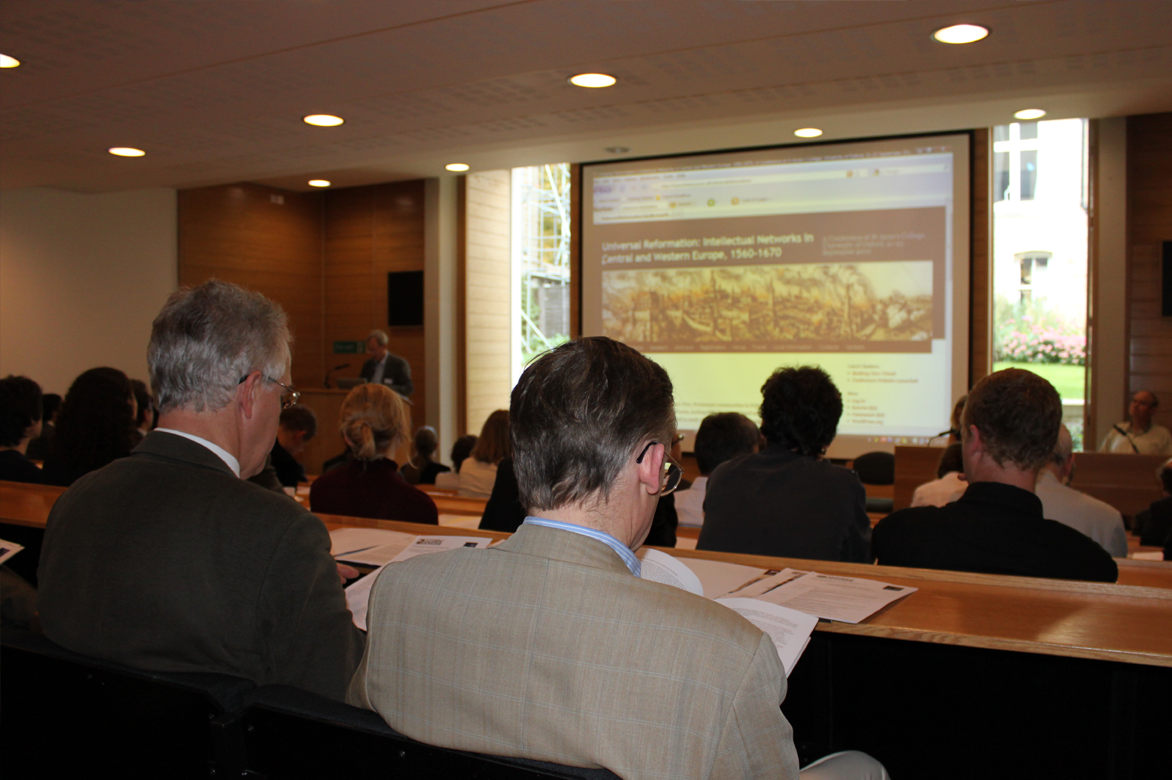
The opening plenary session.
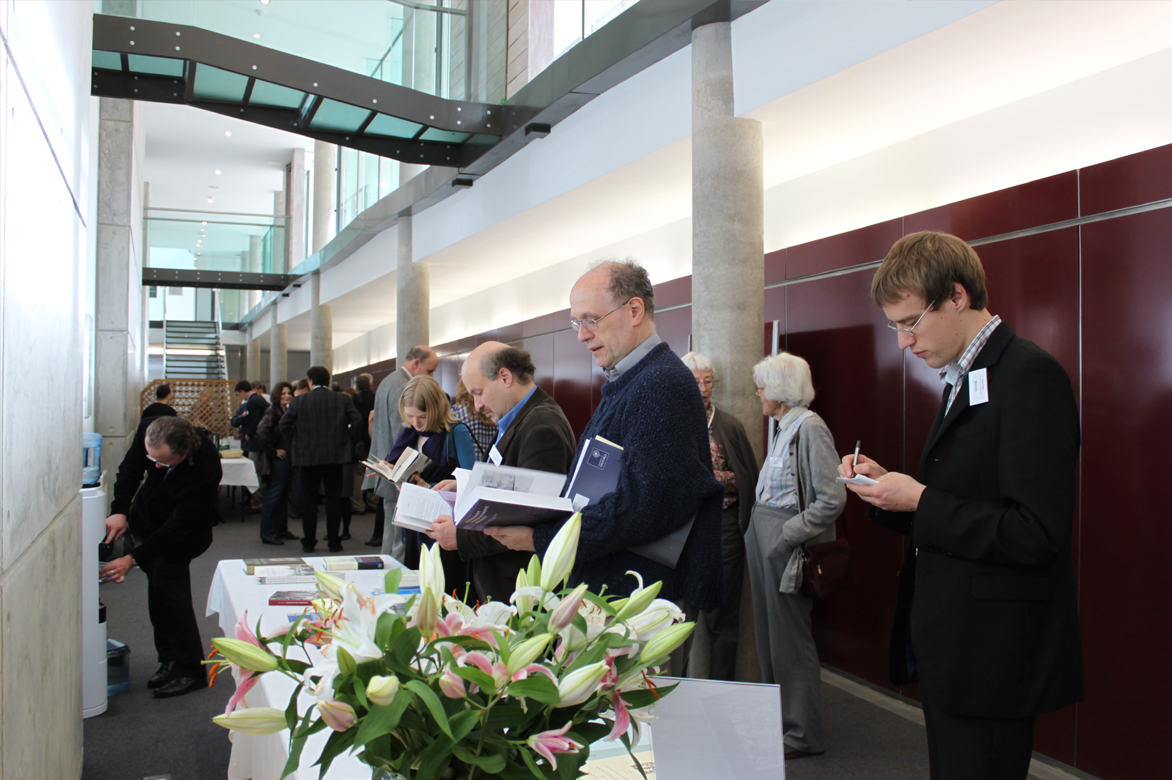
Relaxing in the foyer.
The Project’s inaugural conference, Universal Reformation: Intellectual Networks in Central and Western Europe, 1560-1670, took place at St Anne’s College on 21–23 September 2010. The event, which was attended by over ninety delegates, built on three preparatory European workshops (held in Prague, Cracow, and Budapest), and allowed forty-two emerging and established scholars from eleven countries to share their perspectives on the international networks and intellectual traditions brought into being by the upheavals of the Thirty Years War. Themes explored included institutional networks and intellectual exchange, encyclopaedia and pansophia, the early modern European media revolution, ecclesiastical reconciliation, and millenarianism, prophecy, and propaganda. Delegates also enjoyed a drinks reception in the Bodleian Library‘s historic Divinity School (incorporating a private viewing of the exhibition ‘My Wit was Always Working’: John Aubrey and the Development of Experimental Science), and were present for the prototype launch of our union catalogue. For further information, including speaker profiles and abstracts, please visit the conference microsite; for details of our 2011 event, please visit the conference webpage.
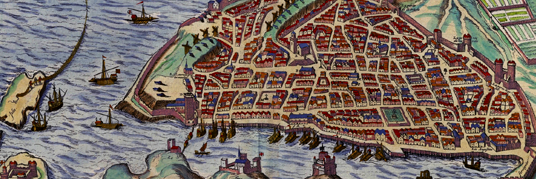
Marseille in 1575. View sourced from Historic Cities.
In the eighth and final installment of the Project’s inaugural seminar series on Wednesday 23 June, held in conjunction with the conference John Selden (1584–1654): Scholarship in Context, Professor Peter Miller (Bard Graduate Center) delivered a wide-ranging overview of ‘Peiresc’s Mediterranean Merchant Network’. Focusing on the letters sent by the polymath from Marseille in the early seventeenth century, Miller elaborated a fascinating story of ‘Peiresc and the sea’ in four parts (which focused respectively on Marseille, space and time in the Mediterranean, merchants, and names). The small, fast nature of Marseillaise ships, especially compared to Venetian craft, meant that letters dispatched from the French port arrived at their destinations quickly (reaching Leiden, for example in fifteen days), and Peiresc’s epistolary activities in the Mediterranean were reliant on an extensive maritime network of non-elite merchants, captains, and sailors, whose identities are in many cases painstakingly recorded (along with other names and biographies) in the letters themselves. This means that it is possible to reconstruct this particular correspondence ‘cloud’ (in Miller’s phrase) in particular detail, and during discussion he provided us with a tantalising glimpse into his forthcoming digitisation initiative which will both visualise Peiresc’s Mediterranean network and link it in an innovative way to an online monograph. For past lectures in the series, please see the seminar webpage; details of the 2011 series will be available shortly.
James Brown
July 16, 2010
Conferences and Workshops, Events, Project Updates
Tags: Communication, Encyclopaedism, Europe, Jan Amos Comenius, Networks, Pansophia, Politics, Religion, Samuel Hartlib, Seventeenth Century
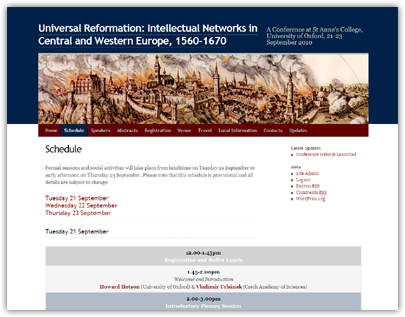 We are pleased to announce that booking is now open for ‘Universal Reformation: Intellectual Networks in Central and Western Europe, 1560-1670’, the first Project conference, which will take place at St Anne’s College, Oxford, on 21-23 September 2010. Organised by Howard Hotson and Vladimír Urbánek, the event will showcase the work of a diverse group of emerging and established scholars, many from east central Europe, who will converge on the intellectual networks and traditions engendered by the upheavals of the Thirty Years War. For provisional programme information, a steadily growing lists of speaker profiles and abstracts, and to book online, please see the new conference website. The deadline for registration is Friday 10 September.
We are pleased to announce that booking is now open for ‘Universal Reformation: Intellectual Networks in Central and Western Europe, 1560-1670’, the first Project conference, which will take place at St Anne’s College, Oxford, on 21-23 September 2010. Organised by Howard Hotson and Vladimír Urbánek, the event will showcase the work of a diverse group of emerging and established scholars, many from east central Europe, who will converge on the intellectual networks and traditions engendered by the upheavals of the Thirty Years War. For provisional programme information, a steadily growing lists of speaker profiles and abstracts, and to book online, please see the new conference website. The deadline for registration is Friday 10 September.


 A recent correspondence-related public lecture by our
A recent correspondence-related public lecture by our 





 Join
Join 